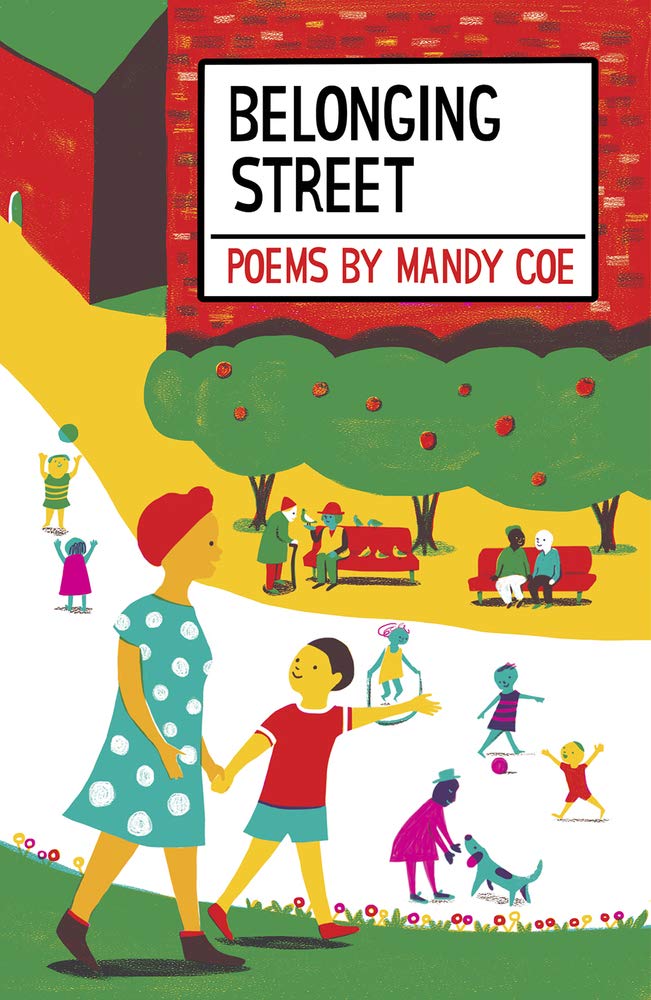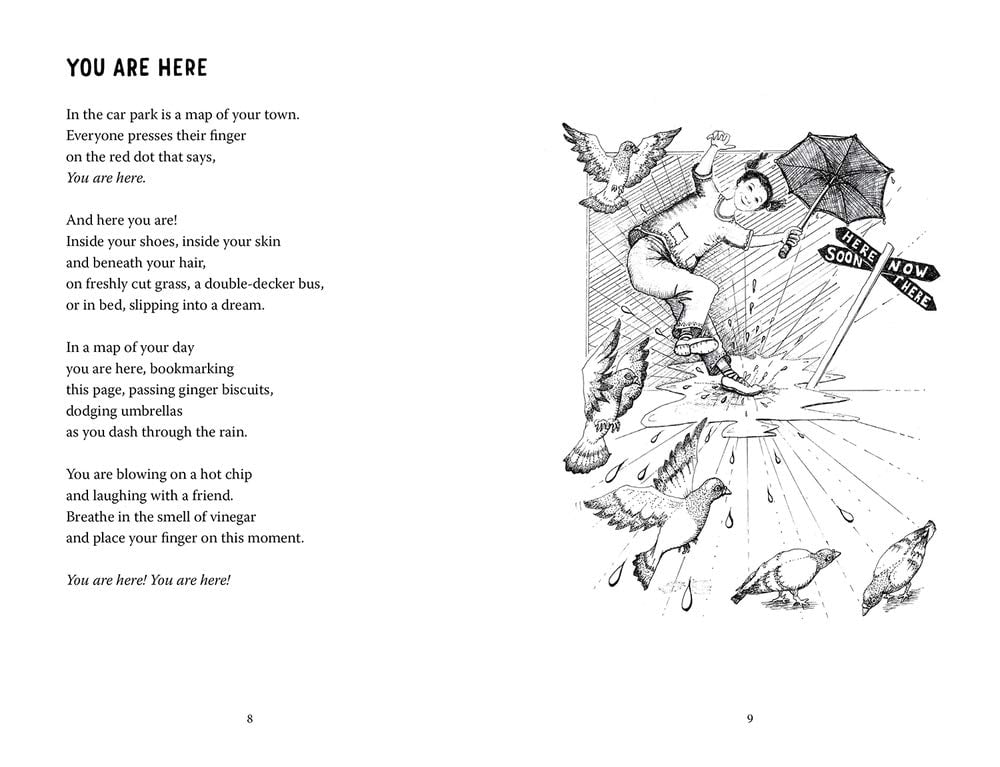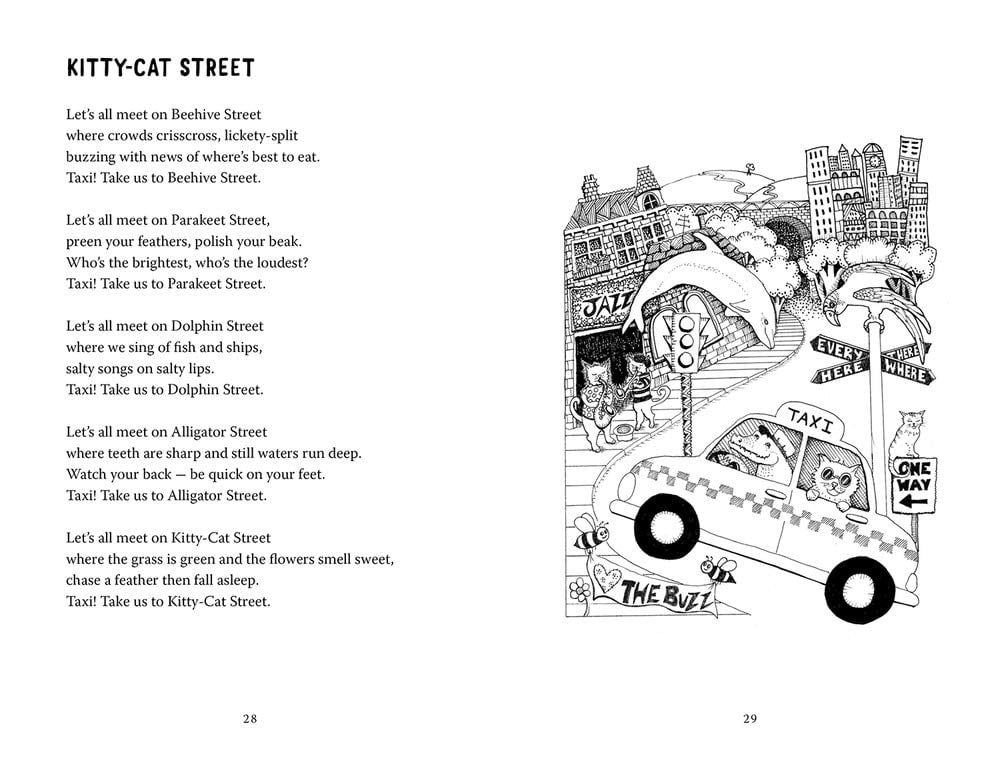Today we welcome children’s poet Mandy Coe into The Reading Realm to talk about her wonderful new collection of poems, Belonging Street…

Without giving too much away, can you tell us about your new poetry collection Belonging Street?
Belonging Street is a collection where trees walk, animals talk, the earth and moon squabble. Oh, and you can get your hair cut by a dragon at the ‘Eyes Shut Barber Shop’! It is about friends and families, urban life and the natural world. The theme of the book is the environment and a quest for belonging – and celebrating the kindness and adventures discovered along the way!
I know that you have illustrated this collection yourself and the artwork is wonderful! How does the illustration process work for you? Do you write the poem first or does an illustration come first?
I am glad you enjoyed the illustrations, Ian! Like lots of artists and writers, I’m a tad dyslexic, so see drawings as poems and poems as pictures. Mostly, they arrive hand in hand like best friends. In fact, when the book is closed, I’m sure they swap characters and clues. Each time I open this book, the poems and pictures seem… a tiny bit different.
I really enjoyed ‘You Are Here’ which encourages us to savour every moment in life and enjoy the here and the now. I wondered what inspired this poem?
They say you should have comfortable shoes and a good bed, because if you’re not in one, you’re in the other. But whether nodding off or lacing up, we are always in a moment – millions of them stretching through our life, like some brilliant necklace of ‘now’. One of the many good things about being a poet is noticing these moments – with all six of your senses (I’m including a sense of humour here).

What struck me about the collection was the great ‘read aloudability’ of it all (I think I’ve just made up a word there!). I could imagine children really enjoy joining in with ‘Kittty-Cat Street’ for example. How important is this and how do you ensure that your poems sound just right?
Oh, I am glad you found that in the book (and ‘read aloudability’ is an excellent word). If a poem is read-aloudable it is shareable, and I definitely pictured ‘Belonging Street’ being read aloud by nannas and children, nieces and aunties… Perhaps a poem invites you to give it breath with deliciousness on the tongue, tricks, trips and flow. To double-check, I ask my good friend, Jim, a jazz musician from Yorkshire, to read the poems aloud. His kind voice allows me to hear which lines run true, and which need polishing. The poems also contains lots of ‘invites to write’ and I hope teachers take up the invitation, working with children to not only read it, but to write in response.

In ‘How to Get Older’ you encourage us to ‘Ask a million questions and don’t stop learning’. What new things have you learnt recently?
Covid has taught me lots of things: that whatever you are feeling – it is ok (and other people are probably feeling it too). I’ve learned that kindness is more valuable than gold – and that there’s a lot more of it about than we ever imagined. I’ve learned that politicians must be accountable, otherwise our heads fill up with red mist. What else… I learned how to make a rug out of old jumpers… how to make pea soup. Oh, and today, I learned that pigeons can live for 27 years.
I’m always interested in the editing process of a poetry book. How did you decide on the order of the poems – are they grouped in a certain way?
I have a process that lots of writers use… it’s the one where you find all the pens and sweets that have rolled under the sofa, while upending furniture. When you’ve cleared enough space, you lay paired pages out on the living room floor! At first, it’s a swapping-game, a kind of poetry-solitaire, then shapes and themes emerge, either complimenting or contrasting. But as well as my living room floor, I had wonderful insights from my editor at Otter-Barry Books, Janetta Otter-Barry.
What three top tips would you give to young poets?
Write diaries, stories and quick-fire descriptions as well as poems (swapping styles will give you muscle). Write about the extraordinary and the ordinary, equally (your notebook is a magic butterfly net, swoosh it about and gather up family sayings, other mother tongues, bit of news, animals, stars, stories and questions). Last one… know that your ever-present ‘listening’ blank page will be your friend for life.
Finally, can you describe Belonging Street in three words?
Torch, map, heart.

